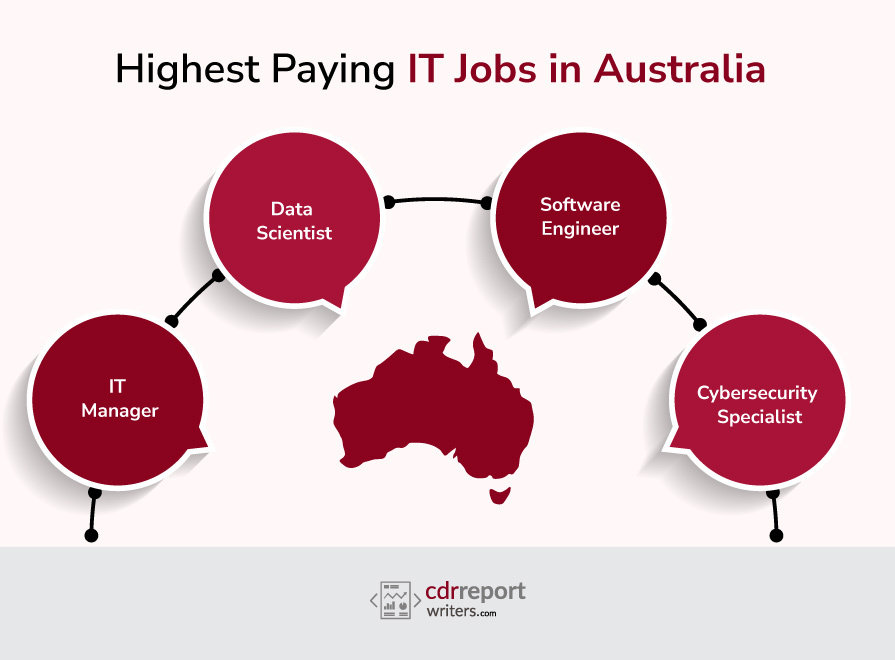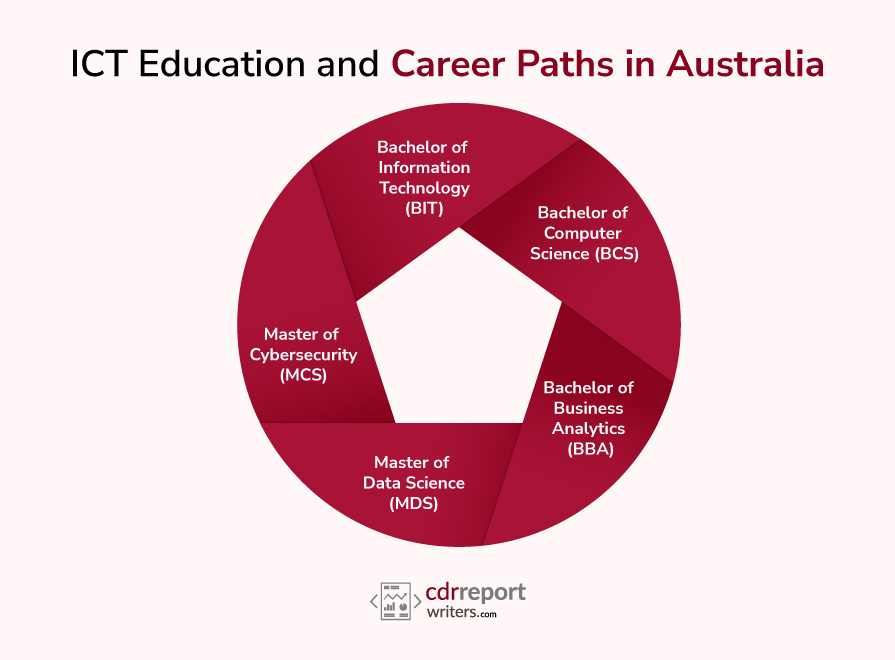
High-Paying IT and ICT Jobs in Australia: Your Gateway to Success
Australia’s IT and ICT industries offer multiple job opportunities, attracting professionals worldwide. This comprehensive blog will delve into the highest-paying jobs in Australia for those IT and ICT professionals looking to migrate to Australia.
Obtaining a positive skills assessment from the Australian Computer Society (ACS) is often required for professionals considering migrating to Australia for ICT-related employment. It demonstrates that the individual’s qualifications and experience align with the standards of the ACS and the Australian IT and ICT industry.
We will explore the best-paying careers, the current job market trends, and the skills in demand. Whether you are an aspiring IT and ICT professional or considering a career change, this article will provide valuable insights into the most lucrative paths within the industry.
Highest Paying IT Jobs in Australia
To apply for these skilled migration visas, individuals must meet specific criteria, including relevant skills assessments, English language proficiency, health, character, and other requirements set by the Department of Home Affairs.
Now, let’s dive deeper into some of the highest-paying IT jobs in Australia, exploring their responsibilities, required skills, and earning potentials:

a. IT Manager
IT managers are crucial in organizations, overseeing technology infrastructure, operations, and teams. They ensure that technology aligns with business objectives, manage IT budgets, and implement strategic initiatives. Critical responsibilities of IT managers include:
- Operating IT personnel and resources
- Developing and implementing technology strategies
- Assessing and recommending technology solutions
- Ensuring network and system security
- Overseeing IT projects and initiatives
To excel as an IT manager, individuals need technical expertise and strong leadership skills. They should possess knowledge of IT systems, infrastructure, and emerging technologies. In addition, effective communication, problem-solving, and team management skills are essential.
Earning potentials for IT managers vary depending on the industry, experience, and organizational size. Entry-level IT managers can earn an average salary of around AUD 120,000 annually, while experienced professionals in senior positions can earn up to AUD 180,000 or more annually.
b. Data Scientist
Data scientists leverage data to drive business insights and decision-making. They employ advanced analytics, statistical modeling, and machine learning techniques to extract valuable information from complex datasets. Critical responsibilities of data scientists include:
- Analyzing data for the identification of patterns, trends, and correlations
- Developing predictive models and machine learning algorithms
- Visualizing data and presenting insights to stakeholders
- Collaborating with cross-functional teams to handle different business challenges
- Implementing data-driven solutions
To excel as a data scientist, individuals should have a strong foundation in mathematics, statistics, and programming. Proficiency in data manipulation, statistical analysis, and machine learning frameworks is crucial. Additionally, data scientists need strong problem-solving, critical thinking, and communication skills.
The earning potential for data scientists is highly lucrative, reflecting the increasing demand for their expertise. Entry-level data scientists can earn an average salary of around AUD 110,000 annually. At the same time, experienced professionals with advanced skills and industry experience can command salaries of AUD 170,000 or more annually.
c. Software Engineer
Software engineers are responsible for designing, developing, and maintaining various important software applications and systems. They collaborate with stakeholders, including product managers and designers, to translate user requirements into functional software solutions. Critical responsibilities of software engineers include:
- Designing software architecture and system components
- Writing clean, efficient, and scalable code
- Conducting thorough testing and debugging
- Collaborating with cross-functional teams throughout the software development lifecycle
- Keeping up-to-date with emerging technologies and industry trends
To excel as a software engineer, individuals should have a strong foundation in programming languages, software development methodologies, and software engineering principles. Proficiency in specific programming languages, such as Java, Python, or C++, is often required. Problem-solving abilities, attention to every detail, and the capability to work collaboratively are also crucial.
The earning potential for software engineers is substantial, with salaries varying based on experience, expertise, and specialization. Entry-level software engineers can earn an average salary of around AUD 90,000 annually, while senior software engineers with extensive experience can earn up to AUD 150,000 or more annually.
d. Cybersecurity Specialist
Protecting sensitive data and systems from cyber threats is paramount in today’s digital landscape. Cybersecurity specialists are responsible for implementing security measures, detecting vulnerabilities, and responding to security incidents. Critical responsibilities of cybersecurity specialists include:
- Developing and implementing cybersecurity strategies and policies
- Conducting vulnerability assessments and penetration testing
- Monitoring networks and systems for potential threats
- Investigating and responding to security incidents
- Educating employees on best security practices
To excel as a cybersecurity specialist, individuals need a strong understanding of information security principles, technologies, and best practices. They should be familiar with network security, cryptography, risk management, and compliance frameworks. Analytical thinking, problem-solving skills, and awareness of every detail are essential in this field.
The earning potential for cybersecurity specialists is highly competitive due to the increasing demand for their skills. Entry-level cybersecurity specialists can earn an average salary of around AUD 100,000 annually. In contrast, experienced professionals with advanced certifications and specialized expertise can earn AUD 160,000 annually.
Learn More: ACS Processing Time for RPL Report⌛️⏱
More Options for IT and ICT Sectors
Regarding the best-paying jobs in Australia, the IT and ICT sectors offer numerous rewarding opportunities. Let’s explore some of the most highly sought-after roles:
1. Data Architect
Data architects are liable for designing and managing data systems within organizations. They create data models, develop databases, and ensure data integrity. Data architects can earn a significant salary from AUD 130,000 to AUD 200,000 annually.
2. IT Consultant
IT consultants advise businesses on technology implementation and strategy. They assess organizational needs, recommend solutions, and assist with technology integration. IT consultants can earn an average salary of AUD 110,000 to AUD 180,000 annually.
3. IT Project Manager
IT project managers oversee the planning, execution, and delivery of IT projects. They coordinate resources, manage timelines, and ensure project success. IT project managers can earn an average salary of AUD 120,000 to AUD 190,000 annually.
4. Cloud Solutions Architect:
The demand for cloud solutions architects has increased due to the rise of cloud computing. These professionals design and implement cloud-based solutions, considering scalability, security, and performance. Cloud solutions architects can earn an average salary of AUD 140,000 to AUD 220,000 annually.
5. Database Administrator
Database administrators manage and organize an organization’s data. They design, implement, and maintain databases, ensuring data availability and security. Database administrators can also earn an average salary of AUD 90,000 to AUD 150,000 annually.
Learn More: What are the KA02 report and its requirement criteria? 🧑🏽✈️🏆
ICT Education and Career Paths in Australia
To pursue a successful career in IT and ICT in Australia, acquiring the necessary education and completing all essential documents for ACS skills assessment is crucial. Several universities, colleges, and educational institutions offer ICT courses and programs tailored to industry needs.
Let’s explore some popular ICT courses and the career paths they can lead to:

a. Bachelor of Information Technology (BIT)
A Bachelor of Information Technology degree provides a comprehensive foundation in IT concepts, technologies, and practices. This undergraduate program covers various areas such as programming, databases, networking, web development, and system administration.
Graduates of a BIT program can pursue diverse career paths, including:
- Software Developer/Engineer
- Systems Analyst
- Database Administrator
- Network Administrator
- IT Consultant
b. Bachelor of Computer Science (BCS)
A Bachelor of Computer Science program focuses on the theoretical aspects of computing. Students learn about algorithms, data structures, software engineering principles, and computer architecture.
Graduates of a BCS program can pursue career paths such as:
- Software Engineer
- Systems Analyst
- Data Scientist
- Research Scientist
- Artificial Intelligence Specialist
c. Bachelor of Business Analytics (BBA)
A Bachelor of Business Analytics program equips students with the skills to analyze complex data sets, derive insights, and support data-driven decision-making.
Students learn about data analysis techniques, statistical modeling, data visualization, and business intelligence tools. Graduates of a BBA program can pursue career paths such as:
- Data Analyst
- Business Intelligence Analyst
- Data Scientist
- Data Consultant
- Market Research Analyst
d. Master of Data Science (MDS)
A Master of Data Science program provides advanced knowledge and skills in data analysis, machine learning, and big data analytics. Students gain expertise in data mining, statistical modeling, and predictive analytics. Graduates of an MDS program can pursue career paths such as:
- Data Scientist
- Data Engineer
- Machine Learning Engineer
- Data Analytics Manager
- Research Scientist
e. Master of Cybersecurity (MCS)
A Master of Cybersecurity program focuses on the principles and practices of information security. Students learn about network security, ethical hacking, digital forensics, and security management. Graduates of an MCS program can pursue career paths such as:
- Cybersecurity Analyst
- Security Consultant
- Security Architect
- Incident Responder
- Risk Manager
In addition to formal education, individuals can enhance their skills and knowledge through professional certifications. Industry-recognized certifications such as Certified Information Systems Security Professional (CISSP), Certified Ethical Hacker (CEH), and Project Management Professional (PMP) can boost career prospects and earning potential.
Learn More: Help prepare the RPL report for the ACS skills assessment. ⏱⌛️
Visa Options for IT or ICT Professionals
For IT and ICT professionals looking to migrate to Australia, the skilled migration program offers several visa options. The most commonly used visa subclasses for skilled IT and ICT professionals include:
1. Skilled Independent Visa (subclass 189)
This visa is for skilled workers who are not sponsored by an employer, a state or territory, or a family member. To be eligible, individuals must meet the points test requirements, which consider factors such as age, English language proficiency, qualifications, work experience, and skills.
2. Skilled Nominated Visa (subclass 190)
This visa requires nomination by a state or territory government agency. It is suitable for skilled professionals who possess skills in high-demand occupations specified by the nominating state or territory. Meeting the specific nomination requirements and scoring the required points on the points test is essential for this visa.
3. Skilled Work Regional Visa (subclass 491)
This visa is for skilled professionals who are willing to live and work in regional areas of Australia. It requires sponsorship by a state or territory government agency or an eligible relative residing in a designated regional area. The visa provides a pathway to permanent residency after meeting certain requirements.
To apply for these skilled migration visas, individuals must meet specific criteria, including relevant skills assessment pathways, English language proficiency, health, character, and other requirements set by the Department of Home Affairs.
Guaranteed Positive Skills Assessment!
Get High-Quality CDR at an Affordable Price
Conclusion
Australia’s IT and ICT industries offer many opportunities for professionals seeking high-paying and rewarding careers. The highest-paying jobs in the field include IT managers, data scientists, software engineers, and cybersecurity specialists. These roles require technical expertise, problem-solving abilities, and strong communication skills.
To embark on a successful career in IT and ICT, individuals can pursue relevant educational programs like a Bachelor of Information Technology, Bachelor of Computer Science, Bachelor of Business Analytics, Master of Data Science, or Master of Cybersecurity.
Additionally, obtaining industry-recognized certifications can further enhance job prospects and earning potential. Staying updated with the latest industry trends, continuously improving technical skills, and developing a robust professional network is essential for long-term success.
By leveraging the opportunities available in Australia’s IT and ICT sectors and investing in education and professional growth, individuals can unlock a world of lucrative and fulfilling career possibilities. Combining the skills assessment from the ACS, skilled migration options, and the expertise of CDRReportWriters, ICT professionals can navigate the migration process with confidence.
This comprehensive approach opens doors to new opportunities, allowing professionals to contribute their expertise to Australia’s dynamic ICT industry while enjoying a high standard of living and quality work-life balance.
Whether you’re a seasoned professional seeking better prospects or a talented newcomer looking to establish your career, Australia’s ICT industry holds immense promise. Embrace the journey, leverage the resources and support available, and make your mark as an IT and ICT professional migrating to Australia. The possibilities are boundless, and the rewards are waiting to be seized.





